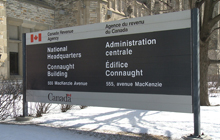Aitchison: A distasteful but correct Tax Court decision

The Canada Revenue Agency tried to fit a square peg into a round hole
 |
The Canada Revenue Agency was rightly miffed at James Aitchison but the Tax Court of Canada ruled in favour of the lawyer, who had not paid income tax since 1992, explains David J. Rotfleisch, CPA, CA, JD, of Rotfleisch & Samulovitch P.C. |
TORONTO, October 30, 2018 – In the finest tradition of the Canadian judiciary, the Tax Court of Canada recently ruled in favour of a lawyer who had not paid income tax since 1992, and owed almost $2.1 million to the Canada Revenue Agency. In his July 6 ruling, however, the Honourable Justice David E. Graham found in favour of James Aitchison of Oshawa, Ont. and ruled against the CRA’s attempt to assess Aitchison under section 160 of the Income Tax Act, "Tax liability re property transferred not at arm’s length.”
Aitchison set up Aitchison Professional Corporation (APC) to provide legal services and transferred his practice, along with the practices of his daughters, into that corporation. The judge found that:
“The financial statements for the files that James was responsible for at APC indicate that his files generated over $3.2 million in revenue from 2007 to 2010. Even after allowing virtually all of APC’s overhead to be allocated to his files, there was still over $1.4 million in profits remaining from those files. Yet, none of these profits were used to reduce James’ tax debts. That is because, despite being the highest grossing lawyer in the firm by far, from 2003 to 2009 James never took any salary or dividends from APC. During the same period, due to an improbable share structure and a complete disregard for dividend rights, James ensured that his daughters received over $1,000,000 in dividends in addition to what appear to have been market rate salaries.”
The CRA was rightly miffed at Mr. Aitchison. And the CRA did what it does all too often: It over-reached and assessed him under section 160 for having transferred property to his corporation. Specifically,“The assessment was premised on the assumption that James had transferred property worth more than $3 million to APC for little or no consideration between January 1, 2007 and September 30, 2010. The Respondent alleges that the property transferred was what the Respondent describes as James’ ‘right to invoice for legal services.’ ”
A “right to invoice for legal services” is of course not property as Justice Graham pointed out to the CRA, which had difficulty articulating its position: “[T]he Respondent is trying to fit a square peg into a round hole. The Respondent is trying to take something that is clearly the provision of a service and make it a transfer of property.”
The court found in favour of the taxpayer and awarded costs against the CRA. Noting that “James has not paid a dime of income tax since emerging from bankruptcy in 1992,” Justice Graham stated that “The outcome of this appeal is distasteful” but “distasteful outcomes should not breed poor legislation.”
While the ultimate result may be distasteful, the behaviour of the CRA in issuing the assessment and of the Department of Justice in proceeding to trial is scabrous and all too common.
As accountants we see inappropriate CRA assessments all of the time. As tax lawyers we file notices of objection and notices of appeal to the Tax Court in cases where the CRA’s position is as flimsy as this one. The Tax Court court politely but firmly told the CRA that they had no business being in court.
Unfortunately the CRA pays no heed to such admonitions and applies its own version of the tax law in too many cases. One final note: Justice Graham made a point of cautioning Parliament against inappropriately broadening the wording of section 160 to cover services.
David J. Rotfleisch, CPA, CA, JD is the founding tax lawyer of Rotfleisch & Samulovitch P.C., a Toronto-based boutique tax law firm. He appears regularly in print, radio and TV. With over 30 years of experience as both a lawyer and chartered professional accountant, he has helped start-up businesses, resident and non-resident business owners and corporations with their tax planning, with will and estate planning, voluntary disclosures and tax dispute resolution including tax litigation. Visit Taxpage.com and contact David through david@taxpage.com.











(0) Comments